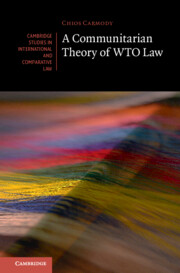Book contents
- A Communitarian Theory of WTO Law
- Cambridge Studies in International and Comparative Law: 181
- A Communitarian Theory of WTO Law
- Copyright page
- Dedication
- Epigraph
- Contents
- Figures
- Preface
- Acknowledgments
- 1 A Theory of WTO Law
- 2 The WTO Agreement as Community
- 3 The WTO Agreement and Justice
- 4 The WTO Agreement as a Law of Obligations
- 5 The WTO Agreement as a Law of Rights
- 6 The WTO Agreement as a Sui Generis Legal System
- 7 A Communitarian Theory and International Investment Law
- 8 Some Concluding Thoughts
- Bibliography
- Index
- Cambridge Studies in International and Comparative Law
8 - Some Concluding Thoughts
Published online by Cambridge University Press: 14 December 2023
- A Communitarian Theory of WTO Law
- Cambridge Studies in International and Comparative Law: 181
- A Communitarian Theory of WTO Law
- Copyright page
- Dedication
- Epigraph
- Contents
- Figures
- Preface
- Acknowledgments
- 1 A Theory of WTO Law
- 2 The WTO Agreement as Community
- 3 The WTO Agreement and Justice
- 4 The WTO Agreement as a Law of Obligations
- 5 The WTO Agreement as a Law of Rights
- 6 The WTO Agreement as a Sui Generis Legal System
- 7 A Communitarian Theory and International Investment Law
- 8 Some Concluding Thoughts
- Bibliography
- Index
- Cambridge Studies in International and Comparative Law
Summary
The chapter summarizes the ideas put forward in this book. It details how justice under the WTO Agreement is transformative as opposed to either purely distributive or corrective. At the same time, that justice must be understood on its own terms and is not for that reason entirely unjust. The chapter also examines the possibility of a communitarian theory serving as a general theory of law. It explains a considerable amount in a way that is naturally coherent and fruitful and offers several predictions and prescriptions about the future of WTO law. At the same time, the chapter acknowledges how a communitarian theory is itself incomplete. This is due to abduction, which stresses the tentative, open-ended nature of current knowledge. Presentism suggests there is a danger in thinking about obligations and rights of countries only in the current moment and not in the broader sense of obligations owed to future generations, and beyond that, the environment we live in.
- Type
- Chapter
- Information
- A Communitarian Theory of WTO Law , pp. 428 - 460Publisher: Cambridge University PressPrint publication year: 2023

